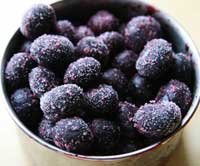|
Market Update - Focus on Frozen
 While frozen inventories remain “a little higher than usual” going into the 2012 season, blueberry growers whose crops are targeted for the processed sector can expect current trends to continue, according to one industry expert. While frozen inventories remain “a little higher than usual” going into the 2012 season, blueberry growers whose crops are targeted for the processed sector can expect current trends to continue, according to one industry expert.
“This last year, generally speaking, it wasn’t a great year but a good year for many of the growers that sell product to packers,” said horticulture/marketing consultant Rod Cook, co-owner of Ag-View Consulting, Inc. in Olympia, Washington. “The inventory is a little bigger than what we’d like to see going into spring.”
Cook, who has been involved with blueberries for over 30 years, explained that the higher frozen carryovers in 2011/12 are attributable to “gaps” in the marketplace.
“We (the Northwest) actually ended up with a very good sized crop in the process market, and yet in August/September, when packers were making contracts with growers in the Northwest, it appeared to many buyers there was going to be a shortage so they kept bidding the price up. In the final outcome, there wasn’t really a shortage, which has led to a little inventory bulge in the freezers.”
Contributing to the false supply picture conception was a very tardy Northwest crop coupled with a weak Michigan crop, Cook said.
That said, Cook said that he doesn’t put too much stock in USDA-provided cold storage figures, which are not only given on a voluntary basis by public cold storage facilities but also not specific as to the quality, and thus potential markets, for the extra berries. “All we know is that it’s frozen blueberries. We don’t know whether it’s A-grade or B-grade or juice grade, sold or not sold. The trends, however, are important and they do show the slow increase in inventory compared to the prior year.”
Cook believes that movement of frozen U.S. inventories will pick up, due in large part to a shorter than expected Chilean 2012 crop and less of that crop being processed than the previous year. Also, Asian tariffs are lower on Chilean berries than U.S. berries. “That gave Asian buyers a little bit of incentive to buy a little bit more from Chile than the United States.”
Cook said that last year the ratio between fresh and processed berries grown in Oregon was roughly 55 percent vs 45 percent, with the ratio almost 50 : 50 for the two preceding years.
In Washington, historically, the process market has received nearly 60 percent of the fruit. That picture will be changing as more and more fresh market berries are coming online in Eastern Washington, Cook said. “That’s where most of the new acreage is being planted.”
He added that, overall, new plantings in Washington, most of those east of the Cascades, continue to outpace those in Oregon.
Cook said that grower prices for product destined for processing depend on several factors, such as weather and the state of the fresh market industry, that can create lots of access or very little access to processed product by packers.
Because fresh market crops often earn growers more and payouts are faster, fresh market will be more attractive for many growers provided the availability of labor is good, Cook said.
He emphasized that growers looking to expand or enter the crop for the first time should have an established buyer before planting. “I would strongly encourage them to have a long sit-down with their marketers.” Some of the things to consider: “Do they need additional varieties? What market windows are they trying to hit?”
Because of packer consolidations in recent years and various paperwork requirements, such as maintaining food safety records, smaller growers (ten acres or less) may find landing a buyer becoming more difficult, Cook said.
|
Message from the Chairman
Packers Set to Enter South Korea on Fresh, New Note
Market Update -
Focus on Frozen
How Sawdust and Fertilizer Rates Impact Yields and Quality
Commission Booth a Hit at Oregon AgFest
New Pristine Supplemental Label Explained
Need an Expansion Loan? Better do the Prep
Beyer Goes to Bat for Blueberries in Salem
Blueberry Commission, Chefs Cook Up Joint Venture
Novel Chemical Applications for SWD Control
Assessment Hike Tabled by USHBC
Blueberry GAP Certifications Growing
Sign-Up for the USHBC Blueberry Alert System |

 While frozen inventories remain “a little higher than usual” going into the 2012 season, blueberry growers whose crops are targeted for the processed sector can expect current trends to continue, according to one industry expert.
While frozen inventories remain “a little higher than usual” going into the 2012 season, blueberry growers whose crops are targeted for the processed sector can expect current trends to continue, according to one industry expert.